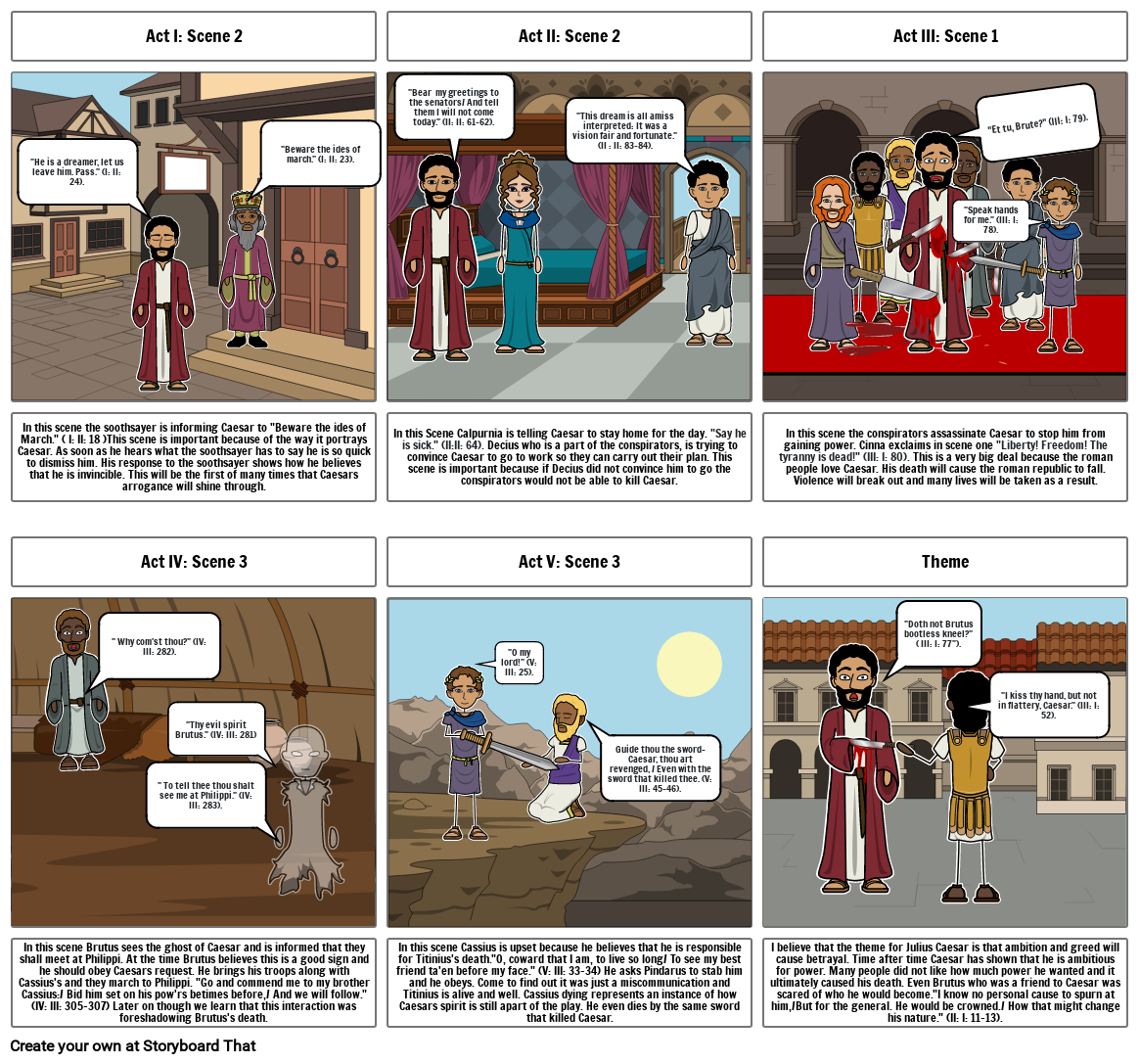Julius Caesar

Storyboard Text
- Act I: Scene 2
- "He is a dreamer, let us leave him. Pass." (I: II: 24).
- "Beware the ides of march." (I: II: 23).
- Act II: Scene 2
- "Bear  my greetings to the senators/ And tell them I will not come today." (II: II: 61-62).
- "This dream is all amiss interpreted: It was a vision fair and fortunate." (II : II: 83-84).
- Act III: Scene 1
- "Et tu, Brute?" (III: I: 79).
- "Speak hands for me." (III: I: 78).
- In this scene the soothsayer is informing Caesar to "Beware the ides of March." ( I: II: 18 )This scene is important because of the way it portrays Caesar. As soon as he hears what the soothsayer has to say he is so quick to dismiss him. His response to the soothsayer shows how he believes that he is invincible. This will be the first of many times that Caesars arrogance will shine through.
- Act IV: Scene 3
- " Why com'st thou?" (IV: III: 282).
- In this Scene Calpurnia is telling Caesar to stay home for the day. "Say he is sick." (II:II: 64). Decius who is a part of the conspirators, is trying to convince Caesar to go to work so they can carry out their plan. This scene is important because if Decius did not convince him to go the conspirators would not be able to kill Caesar.
- Act V: Scene 3
- "O my lord!" (V: III: 25).
- In this scene the conspirators assassinate Caesar to stop him from gaining power. Cinna exclaims in scene one "Liberty! Freedom! The tyranny is dead!" (III: I: 80). This is a very big deal because the roman people love Caesar. His death will cause the roman republic to fall. Violence will break out and many lives will be taken as a result.
- Theme
- "Doth not Brutus bootless kneel?" ( III: I: 77").
- "I kiss thy hand, but not in flattery, Caesar." (III: I: 52).
- In this scene Brutus sees the ghost of Caesar and is informed that they shall meet at Philippi. At the time Brutus believes this is a good sign and he should obey Caesars request. He brings his troops along with Cassius's and they march to Philippi. "Go and commend me to my brother Cassius:/ Bid him set on his pow'rs betimes before,/ And we will follow." (IV: III: 305-307) Later on though we learn that this interaction was foreshadowing Brutus's death.
- " To tell thee thou shalt see me at Philippi." (IV: III: 283).
- "Thy evil spirit Brutus." (IV: III: 281)
- In this scene Cassius is upset because he believes that he is responsible for Titinius's death."O, coward that I am, to live so long/ To see my best friend ta'en before my face." (V: III: 33-34) He asks Pindarus to stab him and he obeys. Come to find out it was just a miscommunication and Titinius is alive and well. Cassius dying represents an instance of how Caesars spirit is still apart of the play. He even dies by the same sword that killed Caesar.
- Guide thou the sword-Caesar, thou art revenged, / Even with the sword that killed thee. (V: III: 45-46).
- I believe that the theme for Julius Caesar is that ambition and greed will cause betrayal. Time after time Caesar has shown that he is ambitious for power. Many people did not like how much power he wanted and it ultimately caused his death. Even Brutus who was a friend to Caesar was scared of who he would become."I know no personal cause to spurn at him,/But for the general. He would be crowned./ How that might change his nature." (II: I: 11-13).
Over 30 Million Storyboards Created

